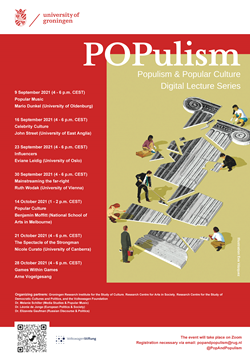Pop and Populism - MARIO DUNKEL (University of Oldenburg): "Listening for Populism in European Popular Music"
POPulism: Popular Culture and Populism is an interdisciplinary online lecture series that brings together leading international scholars and practitioners from different disciplinary backgrounds to give insights into the various forms of interactions between populism, the radical right, and popular culture.
Populism builds on a worldview based on the antagonistic opposition of ‘the good people' and the ‘corrupt elite’, and is often connected to ideologies such as nativism, misogyny, authoritarianism, and racism. In their attempt to redefine cultural hegemony, populists make use of cultural strategies; leaders, parties and movements often explicitly draw on popular cultural means to disseminate their ideologies, for instance, by using social media, internet memes, and computer games.
From popular music, performance, and celebrity politics, to normalization, online recruitment, and mobilization, the speakers of POPulism explore the relationship between culture and populism, unpacking how it can both promote and challenge populist and radical right discourses.
Abstract
The recent rise of populism and nationalism in Europe has often been addressed as a matter of party politics and socio-political transformations. Hence, we still know very little about the cultural changes underpinning and enabling voter preferences for populist and nationalist parties. If we define cultures as structures of feeling, systems of meaning, and orders of knowledge, the investigation of complex cultural changes is indeed indispensable in approaching transformations in political discourses and party preferences.
This lecture therefore focuses on the significance of popular music practices as a central aspect of contemporary European cultures. Music is fundamental to the lives of most people; it is “ubiquitous,” as Anahid Kassabian put it – from the track selected as an early morning cell phone alarm to the music of tv commercials, the self-playing algorithms of streaming platforms, massive live shows, music festivals, and the singing of chants in soccer stadiums, to name only a few ways in which music is relevant.
Due to music’s impact and omnipresence, its politicizations are manifold. They may range from the association of politicians with specific tracks or celebrity musicians to the performance of protest songs in social movements and the subtler politics of background music that may appear apolitical, but nonetheless impacts our subjectivity.
Given this large scope of the field of music and populism in Europe, how do we listen for populism in popular music? Is there such a thing as populist styles or aesthetics in contemporary European popular music cultures? And how does music performatively address, normalize, reaffirm and intervene in populist discourses?
About the speaker
Mario Dunkel is Juniorprofessor of music education at the Carl von Ossietzky University of Oldenburg, Germany. He holds a PhD in American studies. His main research areas are music and politics, the history and practice of jazz, as well as transcultural music education.
His articles have appeared in American Music, the European Journal of Musicology, and Popular Music and Society, among other journals. He is co-editor of the anthology Popular Music and Public Diplomacy and the principal investigator of the international research project “Popular Music and the Rise of Populism in Europe” (2019-2022, funded by the Volkswagen Foundation).
Registration
Registration is required. After registration, you will receive the Zoom link via email.

